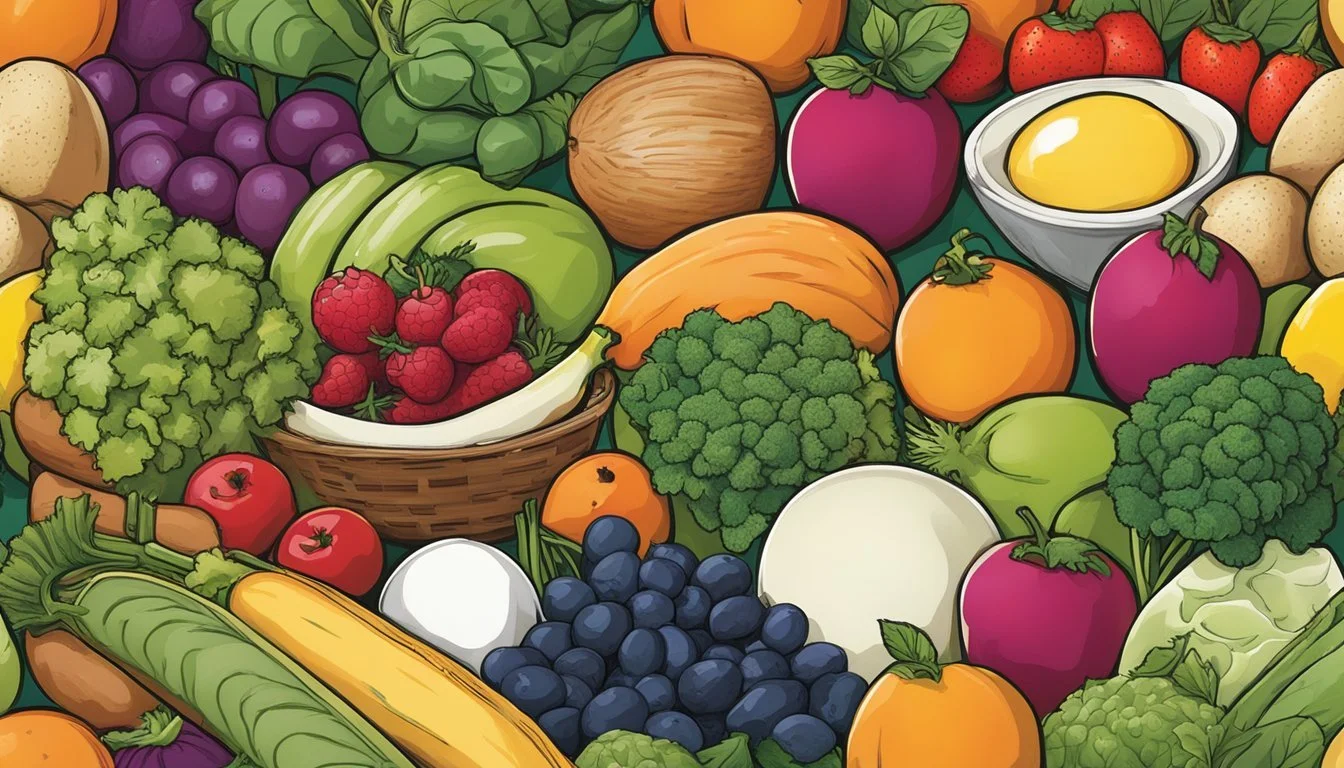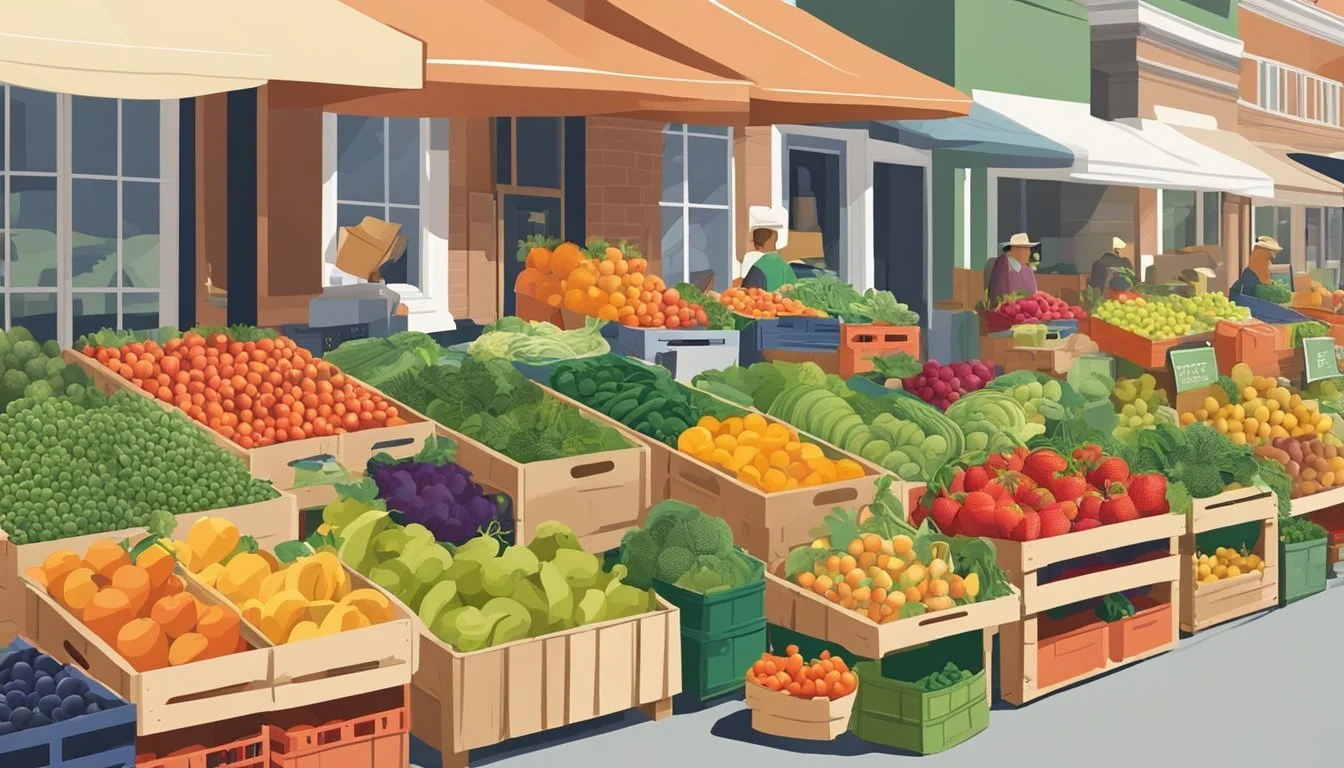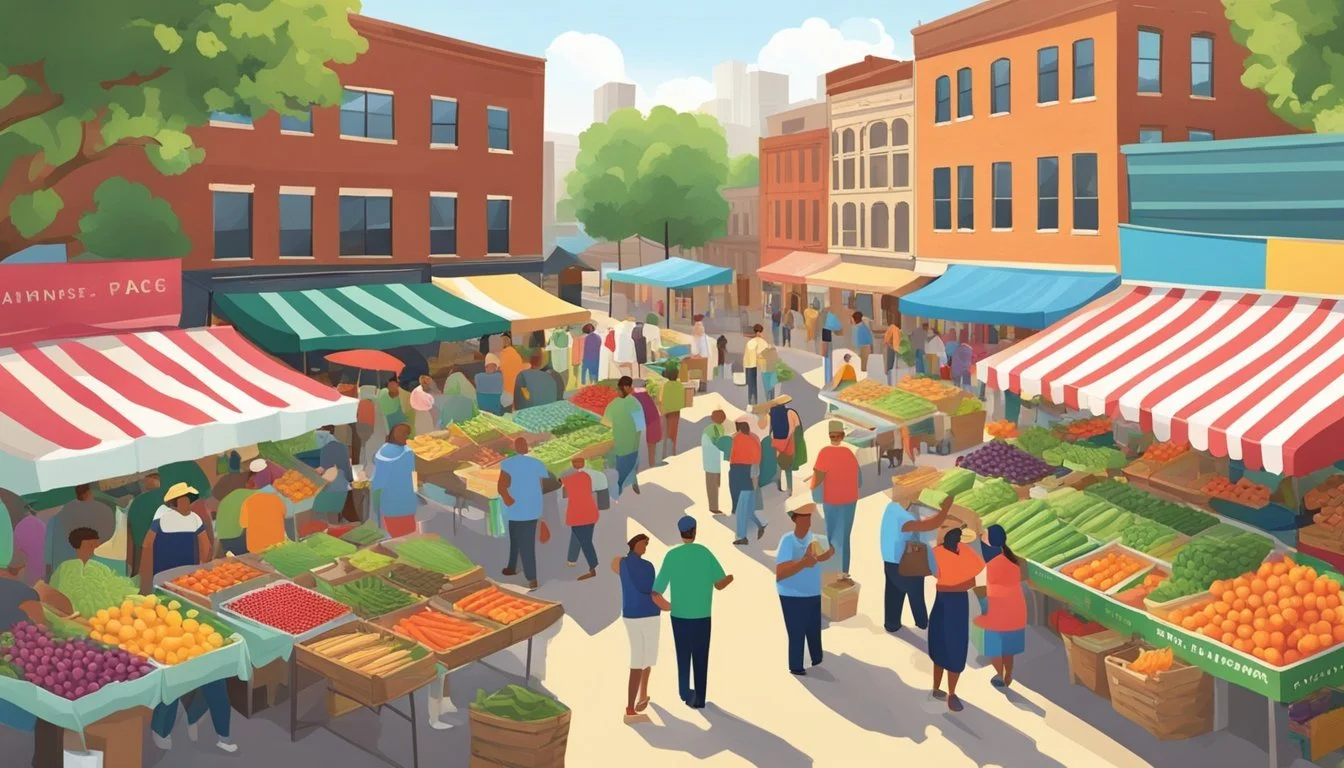Community Supported Agriculture (CSA) in St. Louis, MO
A Guide to Local Produce Partnerships
Community Supported Agriculture (CSA) has established a strong foothold in St. Louis, Missouri, as a model that benefits both local farmers and consumers. Through CSA programs, St. Louis residents purchase shares of a farm's harvest in advance, providing them with a regular supply of fresh, locally-grown produce throughout the farming season. This system not only ensures that consumers have direct access to high-quality, nutritious food but also offers farmers a more predictable income stream by securing sales before the season begins.
The CSA model in St. Louis reflects a growing interest in sustainable farming practices and food sourcing. Consumers are increasingly seeking ways to connect with their food and the people who grow it, and CSA shares have become a popular means for doing so. Each share typically includes a variety of vegetables and fruits, with many farms also offering options for pasture-raised meats and eggs. This approach encourages dietary diversity and seasonal eating, with members often introduced to new types of produce and encouraged to explore creative ways of cooking.
St. Louis prides itself on fostering a community where local agriculture thrives. The city's CSA programs vary, with some offering income-based tiered systems to ensure affordability for all economic levels, while others provide more traditional set-price shares. Many of these programs are integrated into local markets like the Ferguson Farmers Market, where fresh produce is brought directly to the people. The presence of year-round CSA subscriptions further cements the importance of local agriculture in the St. Louis region, making fresh, sustainable food an accessible choice for its residents throughout the year.
Understanding CSA
Community Supported Agriculture (CSA) represents a partnership between local farmers and community members that fosters economic stability for farmers while providing members with a consistent supply of fresh, sustainably grown produce.
History and Concept of CSA
The concept of CSA began in the early 1960s in Germany, Switzerland, and Japan as a response to concerns about food safety and the urbanization of agricultural land. CSA made its way to the United States in the 1980s and has been gaining popularity as a sustainable model for local farming and food consumption. It rests on a simple principle: members, or "shareholders," commit to supporting a local farm for an entire growing season by paying for a share of the anticipated harvest upfront. This upfront commitment helps farmers plan their crops, manage their finances, and directly connect with their community.
Benefits of Joining a CSA
Direct Impact on Local Economy: By joining a CSA, members are directly funding local farmers and contributing to the local economy, ensuring that their food dollars stay within their community.
Accessibility to Fresh, Seasonal Produce: Members receive a diverse array of fresh, often organic produce, usually picked on the day of or the day before distribution.
Encouragement of Sustainable Practices: CSA models inherently support sustainable agricultural practices by providing farmers with the financial security needed to maintain the health of the environment.
Educational Opportunities: Membership often includes newsletters, farm visits, and volunteer opportunities, providing education about seasonal eating and farming processes.
Strengthening of Community Bonds: CSAs offer a unique way to connect with neighbors, form bonds around healthy eating, and engage in direct dialogue with the people who grow their food.
By joining a CSA, members take an active role in their local food system and enjoy the benefits of fresh produce while supporting a method of agriculture that benefits the environment and local economies.
How CSA Works
Community Supported Agriculture (CSA) in St. Louis provides a way for residents to subscribe to a seasonal supply of local farm produce. Members purchase a share and, in return, receive regular deliveries of fresh produce throughout the farming season.
Signing Up for a Share
To participate in a CSA, individuals sign up for memberships, typically at the beginning of the growing season. The sign-up process involves choosing the type of share and the frequency of delivery—whether weekly or bi-weekly. Interested parties can often sign up directly through a CSA's website or by visiting the farm.
Weekly and Bi-Weekly Shares
CSA members usually have the choice between weekly shares and bi-weekly shares. A weekly share consists of a box of vegetables, fruits, and sometimes additional farm products delivered each week. A bi-weekly share follows a similar model but is provided every other week, offering flexibility for smaller households or those with minimal cooking time.
Seasonal Variations in Produce
The contents of CSA shares are seasonally varied, depending on what the farm harvests at a given time of the year. Early season shares might lean on leafy greens and spring vegetables, while late-season boxes could be rich with root vegetables and hearty winter crops. This model supports local agriculture and provides members with the freshest possible produce throughout the seasons.
St. Louis CSA Scene
The St. Louis area offers a wealth of options for those interested in Community Supported Agriculture (CSA), providing fresh, locally-sourced products directly from farms to consumers.
Local CSA Options in St. Louis
In St. Louis, Missouri, consumers are spoilt for choice with an array of local CSAs that cater to diverse needs and preferences. Earthdance operates as an organic farm school and offers CSA shares that contribute to educational programs. Our City Farm provides a variety of produce, often including rare heirloom varieties. La Vista CSA Farm embraces sustainable agriculture, and people can purchase shares for seasonal organic produce. Fair Shares CCSA combines the efforts of several local farms to offer combined CSA shares that include not only vegetables but also meats, cheeses, and other farm goods. Vesterbrook Farm is known for organic and nutrient-dense foods, offering everything from fruits and vegetables to pasture-raised meats and eggs.
Here's a brief list of some notable CSAs in the St. Louis area:
Earthdance: Organic farm school with CSA shares.
Our City Farm: Offers unique heirloom varieties.
La Vista CSA Farm: Focuses on sustainable, organic produce.
Fair Shares CCSA: Provides combined shares from various farms.
Vesterbrook Farm: Known for organic and nutrient-rich offerings.
Notable CSA Farms and Cooperatives
The CSA model in St. Louis is supported by farms and cooperatives that ensure a steady supply of fresh, quality produce to the community. For instance, Seeds of Hope Farm utilizes a tiered system of shares to make produce accessible to all economic levels and contributes to the Ferguson Farmers Market. Additionally, Fresh Pasture Farms has a focus on pasture-raised animals, offering chicken, turkey, pork, and 100% grass-fed beef, as well as eggs available throughout the year. These entities not only represent the diversity of CSA options in the area but also the commitment to sustainable agriculture and community enrichment. They also play a vital role in connecting consumers directly with the sources of their food, thereby strengthening the local food system.
Benefits of CSA to the St. Louis Community
Community Supported Agriculture (CSA) programs in St. Louis play a significant role in supporting the local economy, promoting environmental and health benefits, and fostering community engagement through educational initiatives.
Supporting Local Economy and Farmers
CSA programs in St. Louis provide a stable source of revenue for local farmers by allowing consumers to subscribe to the harvest of nearby farms. These programs result in a predictable cash flow for farmers, ensuring they can sustain their operations. By participating in CSAs, residents directly bolster the local economy and empower local farms.
Environmental and Health Advantages
The environmental impact of CSAs is substantial, as many St. Louis farms follow sustainable and organic practices. These practices reduce the carbon footprint associated with long-distance transportation of goods. Moreover, by offering fresh, organic vegetables and produce, CSAs contribute to improved health outcomes for community members, giving them access to chemical-free food options.
Community Building and Education
St. Louis CSA programs often incorporate educational components that inform members about sustainable farming techniques and the origin of their food. They strengthen the community bonds as members share in the harvest and develop a deeper understanding of the food system. This education is key in fostering informed choices and a greater appreciation for the labor that goes into food production.
Food Types and Products in CSAs
Community Supported Agriculture in St. Louis provides a plethora of options, including a range of produce, organic and chemical-free selections, as well as meat, dairy, and other products supporting a diversified diet directly from local farms.
Varieties of Produce
CSAs in St. Louis offer a diverse array of fruits and vegetables. Members can enjoy seasonal selections that vary from leafy greens and root vegetables to orchard fruits and berries. Depending on the time of year, one might find tomatoes, peppers, cucumbers, apples, and peaches. This diversity ensures that shareholders have access to fresh and flavorful produce throughout the growing season.
Organic and Chemical-Free Options
Many St. Louis CSAs adhere to organic and chemical-free farming practices. They often provide produce that is either certified organic or certified naturally grown. This means the fruits and vegetables received by members are cultivated without synthetic pesticides or fertilizers, ensuring the food is as healthy and environmentally friendly as possible.
Inclusion of Meat, Dairy, and Other Goods
Beyond fruits and vegetables, CSAs may also include meat, such as pasture-raised chicken and 100% grass-fed and finished beef, as well as dairy products and eggs. Fresh Pasture Farms, for instance, offers pasture-raised meats and eggs available year-round for CSA members. Some CSAs may also provide locally produced cheese, adding to the variety of goods that support local agriculture and offer a direct farm-to-table experience.
Choosing the Right CSA for You
In St. Louis, a variety of CSA options provide fresh, local produce to their members. A thorough understanding of membership terms, cost-value evaluation, and additional selection criteria help in making an informed decision.
Understanding CSA Membership Terms
CSAs offer membership agreements where buyers commit to supporting local farms and, in return, receive a portion of the weekly harvest. Membership terms often specify the length of the share season, typically running from mid-May to mid-November. Members can choose full shares or alternate shares; the latter are distributed every other week and can be more suitable for smaller households.
Evaluating Cost and Value
Cost is a vital consideration for potential CSA members. A full share might cost approximately $575, equating to $22 per week, with a slight increase for specific pick-up locations. An alternate share may be priced around $325, or $25 per week. Individuals should assess whether the value of the weekly harvest matches the price, taking into account the variety and volume of produce offered. Some CSAs might include recipes or tips for using the produce, adding value to the membership.
Additional Considerations for Selection
When selecting a CSA, potential members should consider:
Unique offerings: Some farms may provide items that cater to specific religious preferences or dietary needs.
Affordability: Evaluate if the CSA is financially feasible and consider the cost per week against your budget.
Pick-up locations: Ensure the farm’s pick-up options are convenient for you.
Community engagement: Some CSA memberships come with opportunities for on-farm events or volunteer work, enriching the CSA experience.
Selecting the right CSA requires attention to detail and a clear understanding of your own needs and preferences. By focusing on the terms, cost-value relationship, and additional selection factors, individuals can find a CSA option in St. Louis that aligns with their lifestyle.
Logistics of CSA Membership
Joining a CSA in St. Louis involves selecting the best distribution method for your lifestyle and learning how to manage the influx of fresh produce you'll receive on a weekly basis.
Pick-Up and Delivery Options
St. Louis area CSAs offer a variety of pick-up and delivery options to accommodate member convenience. Members typically have the choice to pick up their CSA share at designated farm stands or markets, with common locations including Clayton, Maplewood, Kirkwood, Central West End, St. Peters, Wentzville, Lake St. Louis, and Chesterfield. For those unable to visit pick-up points, some CSAs provide a delivery service that brings fresh produce directly to the member's doorstep. The pick-up schedules are usually consistent each week to help members plan their visits.
Popular CSA Pick-Up Locations:
Clayton: Central location with weekly availability.
Maplewood: Farmers market pick-ups with vibrant community atmosphere.
Kirkwood: Easily accessible for suburban residents.
Chesterfield: Weekend pick-ups for busy professionals.
Managing Weekly Produce
Members receive a share of the season's produce on a weekly basis. Proper management of this produce is crucial to avoid waste and enjoy the variety of fruits and vegetables provided. It is advisable for members to plan their meals around the produce obtained each week and to learn basic preservation methods, such as freezing or canning, for items they can't consume right away. Staying flexible with meal planning and being open to new recipes can improve the CSA experience.
Weekly Produce Management Tips:
Plan Meals: Build weekly menus after receiving your share.
Store Properly: Research and apply the best storage methods for different types of produce.
Preserve Surpluses: Use techniques like freezing, pickling, or canning for excess items.
Community Involvement and Extensions
In St. Louis, MO, Community Supported Agriculture (CSA) initiatives actively engage the community through hands-on educational experiences and open involvement in local farming practices.
Workshops and Volunteering
CSA programs in St. Louis often host workshops where local farmers share their expertise in sustainable farming techniques. Members of the community can learn about organic practices, crop rotation, and soil health. Volunteering opportunities are plentiful, allowing individuals to gain practical experience in farming while supporting local agriculture.
Workshops provided:
Organic farming methods
Crop management
Pest control using natural deterrents
Volunteering involves:
Assisting with planting and harvest
Maintenance of community garden spaces
Involvement in farm-to-table events
Pick-Your-Own and Farm Visits
Several St. Louis CSAs offer pick-your-own options, where members can visit the farms and harvest produce directly from the fields. This fosters a connection between the community and the food they consume. Farm visits also serve as recreational outings where families can learn about the origin of their food and the importance of local agriculture.
Pick-your-own features:
A seasonal selection of fruits and vegetables
Insight into the harvesting process
An interactive farming experience
Educational Programs and Initiatives
CSAs in St. Louis are often involved in educational initiatives, aiming to teach youth and adults alike about food systems and the benefits of local, sustainable farming. Many CSA farms collaborate with schools to provide programs that integrate agricultural education into the curriculum.
Educational offerings include:
Field trips tailored to different age groups
In-school presentations and workshops
Seasonal farming education series
By engaging with CSA programs through workshops, volunteering, farm visits, or educational programs, members of the St. Louis community can deepen their knowledge of sustainable farming practices and contribute to the success and vitality of local farmers.
Addressing Food Security
Community Supported Agriculture (CSA) programs in St. Louis emphasize providing affordable access to fresh food, particularly for low-income households, and support food banks with contributions, thus enhancing food security in the region.
CSAs for Low-Income Households
Seeds of Hope Farm, operating in Spanish Lake, employs an innovative income-based tiered system to make CSA shares accessible across economic levels. This non-profit initiative is a telling example of how local CSAs prioritize food equity. They offer subsidized shares to low-income families, allowing them to purchase fresh, locally-grown produce at cost-adjusted prices, considerably lower than those at traditional grocery stores. Such programs prove critical in communities where access to affordable fresh food is limited.
CSA Contributions to Food Banks
In St. Louis, various CSA farms support food banks by providing nutritious, fresh produce that might otherwise be inaccessible to those relying on food assistance. Farms like Fresh Pasture Farms contribute surplus or unsold items to local food banks. This symbiotic relationship not only reduces food waste but also ensures that individuals and families facing food insecurity receive a healthier array of food choices. CSA programs, in working with non-profits and community organizations, fortify the mission to alleviate hunger and improve food security in the region.
Conclusion
Community Supported Agriculture (CSA) programs in St. Louis have established a robust network promoting sustainable agriculture practices and offering residents access to local, fresh produce. CSAs empower local farmers, forging a vital connection with the community and enabling consumers to directly support the agricultural economy.
Participating in a CSA benefits not just the consumer but also the stability of local farms. St. Louis residents can choose from several CSA options, such as Seeds of Hope Farm and Fresh Pasture Farms, which cater to various preferences and economic circumstances. These farms, alongside others, symbolize a commitment to making locally grown, nutritious food more accessible.
Consistency of support through CSA subscriptions provides farmers with a reliable income stream, encouraging sustainable practices that are better for the environment. It is through these shared efforts that members not only gain a weekly supply of fresh produce but also contribute to a greener, more self-sufficient community.
Fresh Pasture Farms stands out for its pasture-raised meats and year-round egg availability, while other local CSAs like Lee Farms offer flexibility with pickup options. Though some, like Crown Valley Organics, may cease CSA operations, their produce remains a mainstay in the area, affirming the demand and support for regional agriculture.
In conclusion, the CSA model in St. Louis serves as an excellent example of how cities can integrate sustainable food systems within their communities. Supporting these programs ultimately reinforces local economies, fosters community ties, and promotes a healthier lifestyle amongst participants.











